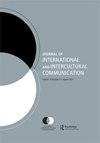“Feminists really are crazy”: The Isu Station incident and the creation of an androcentric, misogynistic community on YouTube
IF 2.2
Q2 COMMUNICATION
Journal of International and Intercultural Communication
Pub Date : 2021-10-12
DOI:10.1080/17513057.2021.1985589
引用次数: 1
Abstract
ABSTRACT Controversy followed news of an altercation in a Seoul bar between a group of women and men; this was later dubbed the “Isu Station incident.” Cellphone video complicated the women’s account, providing discursive space to air men’s grievances and to discipline recent feminist challenges. The YouTube-distributed video and comments advanced an argument of “enlightened sexism” in which users argued for gender equality while demonizing feminism and claiming reverse sexism. Drawing on hegemonic masculine discourses in South Korea, they created an affective, androcentric, and misogynistic space in which they construct themselves as idealized, tolerant victims of feminist excess.“女权主义者真的疯了”:伊述站事件和在YouTube上创建一个以男性为中心、厌恶女性的社区
首尔一家酒吧里一群男女发生口角的新闻引发了争议;这后来被称为“伊述站事件”。手机视频让这些女性的叙述更加复杂,为男性的不满和近期女权主义挑战提供了话语空间。在youtube上流传的视频和评论中,网民们在妖魔化女权主义、主张反向性别歧视的同时,主张性别平等,提出了“开明的性别歧视”的主张。她们借鉴了韩国的男性霸权话语,创造了一个情感上的、以男性为中心的、厌恶女性的空间,在这个空间里,她们把自己塑造成理想化的、宽容的女性主义过剩的受害者。
本文章由计算机程序翻译,如有差异,请以英文原文为准。
求助全文
约1分钟内获得全文
求助全文
来源期刊

Journal of International and Intercultural Communication
COMMUNICATION-
CiteScore
3.80
自引率
12.50%
发文量
19
 求助内容:
求助内容: 应助结果提醒方式:
应助结果提醒方式:


